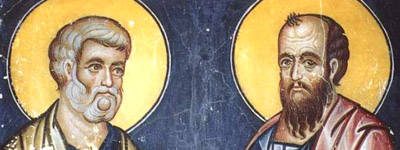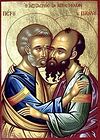

| Previous day | Next day |
| Old Style
January 16
|
Wednesday |
New Style
January 29
|
|
32nd Week after Pentecost.
Tone 6.
Fast Day. |
Fish, wine and oil allowed.
|
![]() Veneration of the Precious Chains of the Holy and All-glorious Apostle Peter.
Veneration of the Precious Chains of the Holy and All-glorious Apostle Peter. ![]() Blessed Maximus, priest of Totma (Vologda), fool-for-Christ (1650).
Blessed Maximus, priest of Totma (Vologda), fool-for-Christ (1650).
Martyrs Speusippus and his brothers Eleusippus and Meleusippus, their grandmother Leonilla, and with them Neon, Turbo, and Jonilla (Jovilla), in Cappadocia (161-180). Martyr Danax the Reader, in Macedonia (2nd c.). St. Honoratus, archbishop of Arles and founder of Lerins Monastery (429).
St. James of Tarentaise (429). St. Fursey, Irish missionary monk of Burgh Castle (East Anglia), Lagny, and Peronne (Gaul) (650). St. Romilus the Sinaite, of Ravanica Monastery (Serbia) (1375). St. Gerasimus II, patriarch of Alexandria (1714). New Hieromartyr Damascene of Gabrovo, hieromonk of Hilandar, at Svishtovo (1771). New Hieromartyr Nicholas, priest, of Mytilene (1777).
Repose of Elder Theodore of Irkutsk (1923) and Priest Demetrius Gagastathis of Platanos, Trikala (1975).
Thoughts for Each Day of the Year
According to the Daily Church Readings from the Word of God
By St. Theophan the Recluse

Wednesday. [Eph. 3:8-21; Mark 11:23-26]
If you do not forgive others’ trespasses against you, then your heavenly Father will not forgive you your trespasses, said the Lord. Who does not forgive others? A righteous person, or one who considers himself righteous. To such a person nothing remains other than to judge, pronounce sentences, and demand execution of the guilty. Does a man who feels guilty have any time for others? Would his tongue dare to judge another and demand gratification from him, when his own conscience unceasingly convicts and unceasingly threatens him with God’s righteous judgment? So, is it better to sin than to be self-righteous? No, in every way be zealous for righteousness; but with all of your righteousness, recognize that you are an unworthy slave, and recognize this with undivided thought—that is, not that the thought of your unworthiness is in the foreground, while the feeling of righteousness hides in the background, but preserve a full awareness and feeling of yourself as unworthy. When you attain this, (and you must work for this, for it is not acquired suddenly), then no matter how your brother trespasses against you, you will not call him to account, because your conscience will be repeating: “and you do not deserve this only, it is not enough for you.” Then you will forgive him; and having forgiven, you yourself will be made worthy of forgiveness. So for your whole life let there be forgiveness after forgiveness, and at the judgment all will be forgiven you.
Articles
 The apostles Peter and Paul |
 The Holy Glorious and All-Praised Leaders of the Apostles, Peter and PaulSermon of Saint Augustine, Bishop of Hippo |
 Blessed Maximus the Fool-for-Christ of Totma, VologdaBlessed Maximus, Priest of Totma, was for a certain time, a priest in the city of Totma in the Vologda diocese. |
 Martyr Danax the Reader, in MacedoniaThe Holy Martyr Danax lived during the second century and served as reader at a church in Auleneia in Macedonia. |
 St. Honoratus the Archbishop of Arles and Founder of Lerins MonasterySaint Honoratus was born in Gaul (modern France) about 350, and came from a distinguished Roman family. |
 Venerable Romilus of RavenicaSaint Romilus the Hesychast was the disciple of Saint Gregory of Sinai (August 8). He was born in Vidin, Bulgaria of a Greek father and a Bulgarian mother. |









